From Flash in the Peak District to the Isle of Eigg.
Questions as to whether rural is getting its fair share of levelling-up funding.
.
This weekend’s Countryfile on BBC One featured isolated communities having to look after themselves: BBC iPlayer – Countryfile – Flash: The UK’s Highest Village in Winter
We first go to the Derbyshire Peak District:
It’s 60 years since the Big Freeze, one of the coldest winters on record, when even the sea froze over, and rural communities were cut off by blizzards and towering snowdrifts. Anita Rani and Joe Crowley are in Flash, the UK’s highest village, to see how the community coped then and how they brace for winter now.
Where today there is quite a community, despite its isolation:
Flash is an isolated community with a small population and previously had a school which was attended at one point by just four pupils. Walk through the village now and you will see a village shop, Flash Bar Stores, and a brewery, Flash Brewery which sells its beers at the local shop and farmers’ markets in the area. There’s also a pub in the village – the New Inn – and just outside of the village you will find The Travellers Rest. Years ago the village also had a reputation for being a centre for illegal activities such as cock fighting and counterfeiting, but now, you’ll be pleased to know it is peaceful and scenic with pretty little houses on quiet lanes. Take a trip to Flash – the scenic Staffordshire village which is the highest in the UK – Stoke-on-Trent Live and Home – Flash Village Hall Portal and (20+) Flash Bar Stores | Buxton | Facebook
Countryfile then takes us to the Scottish Highlands and Islands:
Tom Heap is on the Isle of Eigg, where islanders aren’t waiting for government to help them level up but are doing it for themselves.
It’s got rather political, with a big fanfare for ‘levelling up’ for one island: ‘UK Government has saved Fair Isle as an inhabited island’: Levelling up cash will buy first ferry in 40 years
But not everyone is impressed: On the edge: Ministers accused of abandoning Scotland’s island communities and urged to act on homes, jobs and ferries to secure their future

In fact the islanders of Eigg gave up waiting over quarter of a century ago: Isle of Eigg: Scottish island to celebrate 25 years of community ownership | The National
The community has been active on many levels.
To cut a long story short, in the summer of 1991 four of us established The Isle of Eigg Trust – Tom and me, Bob Harris a Lochwinnoch sheep farmer and community councillor, and for a short time, the artist Liz Lyon. We aimed to bring the island into ownership for the community. We were, as our critics rightly said, “a penniless trust”. But symbolically, here was a Sword of Damocles hanging over landed power, a claim of right to what had once been taken from the people. It was ridiculous, yet perhaps “a trust in waiting”. How the ‘People’s Republic of Eigg’ lit a fire under land reform in Scotland | The National
What they have achieved since is remarkable. The population has doubled, tourism has boomed, the forests are being actively managed, houses have been restored and built, and the islanders have installed their own renewable electricity supply. It is a story of success and of hard work. Those who said it was not going to be possible have been proved wrong and in the 25 years of community ownership, decisions have been taken by consensus with (remarkably) only one vote. Andy Wightman: In modern Scotland, power is becoming more centralised
At local level, a range of actions have been taken to ensure the islands remain places to live. In 2021, the Hebridean Housing Partnership restricted the sale of property on Uist to islanders or first-time buyers only amidst rocketing prices, with an ex-croft on Harris listed for £1.5m last year. And when the community-owned Isle of Eigg Trust put its Sandamhor Bothy up for sale last autumn, prospective buyers had to commit to being “an active contributing member of the community”. The housing tensions in Scotland’s tourist hotspots
This is very much part of the bigger picture of rural communities being ‘neglected’ when it comes to ‘levelling up’ – a theme close to the heart of what the RSN works on:
The Countryfile episode aired on Sunday 22nd January 23 featured research by the Rural Services Network. In a story focusing on Levelling Up and the investment by the Government into this policy approach, raised questions as to whether rural is getting its fair share of the funding. It showed a feature on the island of Eigg, one of the Hebridean Islands.
It included the following: “Recent report commissioned by the Rural Services Network in England said the Government’s plans risk neglecting rural areas, using the wrong information and data to make decisions meaning the needs of 12 million rural residents could go ignored.”
The report shared a response from the Department for Levelling Up, Housing and Communities which said, “the islands play a key role in levelling up and we continue to support rural communities…to improve their local infrastructure.”